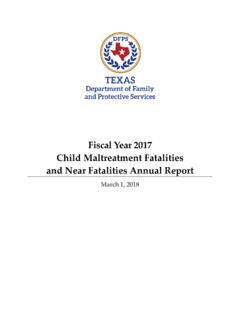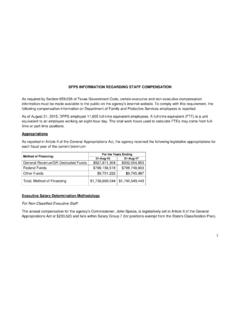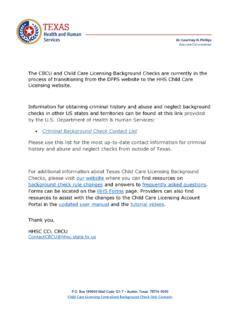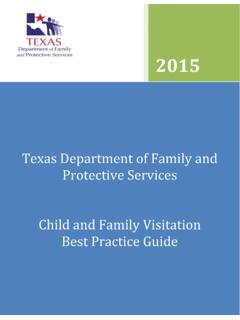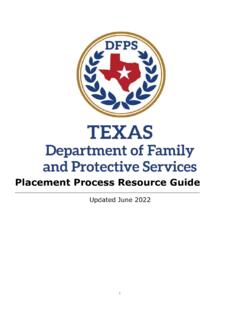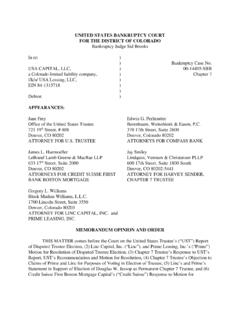Transcription of SECTION 3 LITIGATION ESSENTIALS - dfps.state.tx.us
1 1 Contents SECTION 5 LITIGATION ESSENTIALS .. 3 JURISDICTION .. 3 Temporary Emergency Jurisdiction .. 4 Texas Residents & No Prior Custody Order .. 5 Prior Custody Order in Texas- Court of Continuing Exclusive Jurisdiction .. 5 Prior Custody Order from Another State .. 6 Recognition of Out-of-State, Tribal or Foreign Child Custody Orders .. 7 Registration Procedure .. 8 Child Custody LITIGATION Across State and National Borders .. 8 PARTIES .. 10 Who Can Intervene in a SAPCR? .. 10 90 Day Window After Parental Rights Terminated .. 11 PATERNITY QUESTIONS AND SOLUTIONS .. 11 Who is the Father? .. 13 What Kind of Father Is He? .. 14 Presumed Father .. 14 Denial of Paternity by Presumed Father .. 15 Rebutting the Presumption.
2 15 Alleged Father .. 16 Paternity Registry .. 17 Affidavit of Waiver of Interest .. 18 Acknowledged Father .. 19 Adjudicated Father .. 21 Termination of Parental Rights When Parent is the Petitioner.. 21 Genetic Testing .. 22 APPOINTMENTS .. 24 SERVICE OF PROCESS .. 25 From Personal Service to Posting .. 26 Paternity Registry .. 27 Missing Parent in Military .. 27 Out of State Parties .. 27 DEFAULT JUDGMENTS .. 28 2 What the Record Must Show .. 29 Pre-Answer vs. Post-Answer Defaults .. 30 Servicemember's Civil Relief Act Compliance Required .. 31 CHILD SUPPORT .. 31 Pleading and Orders .. 31 Calculating Amount of Child Support Award .. 32 Resolving Child Support Payments when the DFPS Conservatorship case is Being Dismissed.
3 34 3 SECTION 5 LITIGATION ESSENTIALS January 2016 JURISDICTION A court s authority to issue an order in a child protection suit hinges in part on where the child and parents reside, whether another court has issued a prior custody order, and how long any new Texas residents have lived in this state. The Uniform Child Custody Jurisdiction and Enforcement Act (UCCJEA), which is codified in CHAPTER 152 of the TEXAS FAMILY CODE, contains the basic jurisdiction provisions for resolution of a child custody suit. Now enacted in 49 states (plus the Virgin Islands, Guam, and the District of Columbia),1 the UCCJEA determines whether a state court has jurisdiction to make an initial child custody determination or to modify an existing child custody The UCCJEA governs all proceedings relating to child abuse and termination of parental rights, but does not apply to adoption proceedings or proceedings for emergency medical care of a In addition to the UCCJEA, if there is prior child custody LITIGATION in Texas when DFPS files a Suit Affecting the Parent Child Relationship (SACPR), state law governing the "court of continuing, exclusive jurisdiction" (CCEJ)
4 Dictates which Texas court has When a Texas court renders a final order in a SAPCR, that court acquires exclusive jurisdiction over child-related issues and is known as the court of continuing, exclusive When this occurs, no other court has jurisdiction over a suit involving the child except in an emergency action brought by DFPS to protect the health and safety of the child or a suit in which adoption is A subsequent suit must be initiated as an original proceeding unless the CCEJ has rendered a final The following final orders do not create continuing, exclusive jurisdiction: Voluntary or involuntary dismissal of a SAPCR; A final order in a paternity suit that finds that the alleged or presumed father is not the biological father (unless the child was the subject of a prior filed suit); and A final order of 1 Enactment legislation was introduced in 2015 in Massachusetts.
5 For updated information on the status of a state s enactment, check the Uniform Law Commission website at 2 TEX. FAM. CODE ; 3 See TEX. FAM. CODE (4); 4 TEX. FAM. CODE CHAPTER 155. 5 TEX. FAM. CODE 6 TEX. FAM. CODE (c). 7 TEX. FAM. CODE (d). 8 TEX. FAM. CODE (b). 4 Temporary Emergency Jurisdiction DFPS is authorized to file for emergency relief to protect a child in the county where the child is "Home state" jurisdiction under the UCCJEA requires that a child reside in Texas for six consecutive months prior to DFPS intervention, but a court can assume temporary emergency jurisdiction if the child: Is present in Texas; and Has been abandoned; or The child, a sibling or a parent is subjected to or threatened with mistreatment or Neglect is not a basis for emergency jurisdiction under the UCCJEA, but the term "mistreatment" is likely broad enough to encompass all circumstances when emergency intervention is required.
6 If an Indian child (as defined by the Indian Child Welfare Act) is involved, there are special limits on a state court s emergency The limitations on emergency jurisdiction make it critical to find out quickly: Has the child lived with a parent (or person acting as a parent) in Texas for the past six months? What court issued any prior order? If there is a prior court order making a child custody determination, it is essential to determine: Whether another Texas court has continuing, exclusive jurisdiction; and Whether a court in another state has authority that precludes this court from acting beyond issuing the emergency If there is no prior order and no proceeding begun in another state, an emergency order rendered by a Texas court remains in effect until a state with jurisdiction under the UCCJEA issues an order.
7 If that does not occur, an order issued by the Texas court becomes a final child custody determination if the court so indicates and Texas becomes the child s home If there is a prior order entered in another state in conformity with the UCCJEA, a Texas court must specify in the emergency order a period of time sufficient to allow the litigant 9 TEX. FAM. CODE 10 TEX. FAM. CODE (a); In re , 209 821(Tex. App. Amarillo 2006, no pet.) (Texas court had authority to terminate parental rights of nonresident father, where Texas became child s home state in the intervening 14 months after court assumed emergency jurisdiction following parents drug arrest in Texas); In re , 163 3d 191 (Tex.)
8 App. Beaumont 2005, no pet.) (where Texas not home state and LITIGATION pending in Michigan, Texas court only authorized to issue emergency orders for protection). 11 See Practice Guide, SECTION 4, INDIAN CHILD WELFARE ACT 12 In re 294 866 (Wyo. 2013) (Texas has continuing exclusive jurisdiction, unless it declines jurisdiction, where mother and alleged father live in Texas, custody proceeding pending in Texas, and children lived in Texas until they went to Wyoming for a visit; neglect petitions were filed within two months of visit to Wyoming). 13 TEX. FAM. CODE (b). 5 an opportunity to obtain a court order from that The order issued by the Texas court is then valid until the original court issues an order or the stated time period expires.
9 Texas Residents & No Prior Custody Order Perhaps the most common scenario DFPS encounters involves parents who both reside in Texas when a SAPCR is filed. If there is no prior child custody order, in Texas or another state, the issue is whether the court has jurisdiction to make an initial child custody determination. Texas has "home state" jurisdiction under the UCCJEA if a child has lived in Texas with a parent (or person acting as a parent) for at least six consecutive months before commencement of the suit (or in the case of a child less than six months old, since birth). Alternatively, if no other state has "home state" jurisdiction (or such state has declined jurisdiction), a Texas court can assume jurisdiction if the child and at least one parent (or person acting as a parent) have a "significant connection" to the state and substantial relevant evidence is in the Prior Custody Order in Texas- Court of Continuing Exclusive Jurisdiction If there is a prior child custody order from a Texas court when DFPS files suit, the issue is which Texas court has jurisdiction.
10 To find out whether another court has continuing, exclusive jurisdiction (CCEJ), after the adversary hearing DFPS must request that the vital statistics unit (VSU)16 identify any Texas court that has continuing, exclusive Within 10 days of a request the VSU must either identify the docket number of the suit or confirm that the child has not been the subject of a prior A final order entered without this information is voidable upon a showing that another court had continuing, exclusive If the VSU search reveals that a court of continuing, exclusive jurisdiction exists, the issue of which court adjudicates the case is determined by TEXAS FAMILY CODE transfer provisions, not the TEXAS RULES OF CIVIL PROCEDURE and venue statutes that govern other civil While the general rule is that a motion for transfer by the petitioner should be filed with the initial pleadings.

